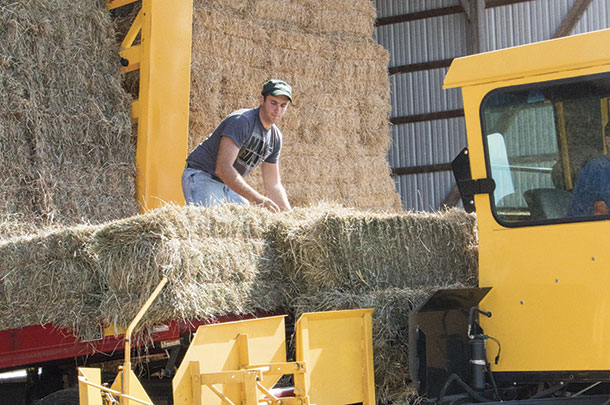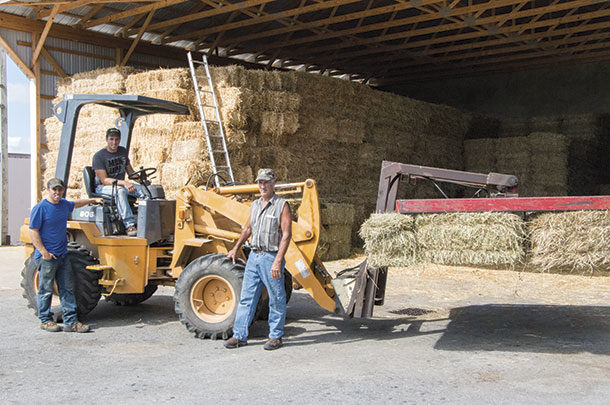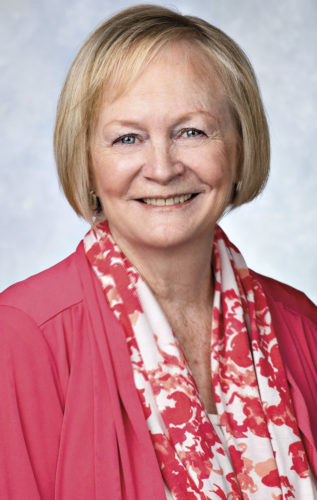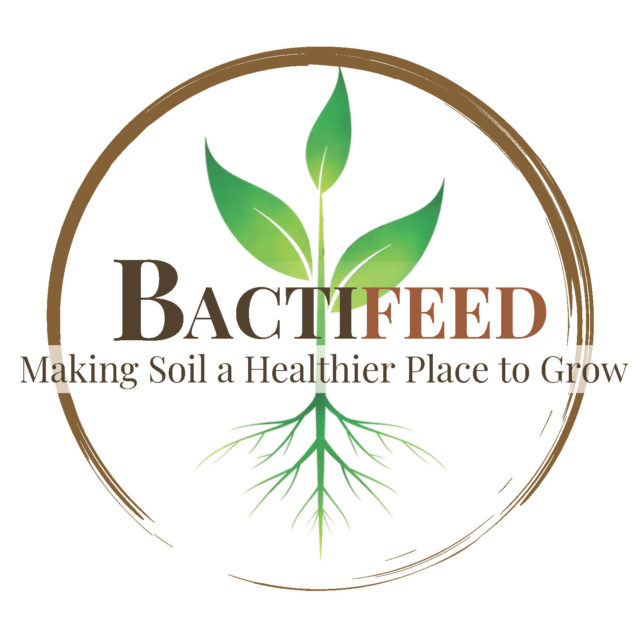Within just a few minutes of beginning our conversation, I was distinctly impressed with the thought, “This is what good mentoring looks like.”
Ryan Stoltzfus – After attending Christ for the Nations College in Texas, Ryan spent several years working away from the farm and returned seven years ago. He says, “Dad’s always talking to us about ‘what do you enjoy doing – do you want to sit on a tractor? If you do, don’t get to the point where you have 20 guys working for you.’ Or he’ll ask if we enjoy office work, or what we enjoy doing, and trying to get us to work within our strengths and expertise.”
Because of conversations like this, Ryan’s talents of patience and attention to detail have been channeled into working with their horse-hay customers and handling the logistics of delivery schedules. He strives to be efficient with deliveries – not sending a pickup load of hay 30 miles away just to turn around the next day and do the same thing.
Quintin says, “A lot of guys we end up buying straw and hay from, they’ll come in with just a small trailer or truck with 100 to 150 bales. We’ll take a truck pulling a trailer with 400 bales on board and try to make as many deliveries as we can in one trip just to be more efficient.” And it’s Ryan’s job to make that efficiency happen.
The farm is comprised of 200 acres, using an alfalfa-grass mix on 90 acres (orchardgrass and fescue), rotated with soybeans and rye. The horse market in southeast Pennsylvania consumes 95 percent of the hay, of which the majority is put up in 40-pound small square bales. Added to those 60,000 bales, they purchase another 100,000-plus bales from various producers to maintain a regular customer base.

Quintin Stoltzfus – Younger brother Quintin left the family farm for two years to attend bible college, but he always planned on coming home, although he wasn’t certain if that meant coming home to the farm or not. But he was drawn to his roots, and today, his interests and strengths are more evident in keeping the farm’s books. He says, “I enjoy doing the books, but I don’t want to be full time in the office, so I like the balance of the book work and some other office work and then helping Dad with odd jobs and doing a little of everything.” And Ryan adds, “Quintin is probably the most tech-savvy out of the three of us.”
That’s probably an understatement. While Ryan and Quintin both sport up-to-date computers and program versions on their office desks, Craig points to his rolltop desk in the corner covered with sticky notes (and no computer) and laughs when he says, “I only got a smartphone hoping it would make me smarter.”
Quintin also has the patience and ability to work with horse-hay customers. Craig says, “They’re both good with people, but Quintin especially. He’s patient. I would get frustrated and throw up my hands, even though I’m a Christian, but he has the patience of Job, and he’ll sit down and work with them and talk with them and figure out a way through it.”
Despite the various roles, there is a lot of cooperation and crossover when circumstances warrant. It’s “all hands on deck” whenever it’s time to do fieldwork. Craig laughs and says half-serious and half-joking, “As a matter of fact, if you’re here on the right day, we’ll put you on a tractor.”

Both Ryan and Quintin landed part-time jobs with a towing service their first year back, so the farm didn’t take a substantial financial hit. After the first winter, a large retail store approached them and asked if the farm would be interested in selling hay through their stores. It increased the income (and workload) of the farm sufficiently that both were able to concentrate full time on farming thereafter. Today, that retail outlet is about 20 to 25 percent of their annual sales.
And other markets shifted. About that same time, during a particularly hard winter, a lot of farmers ran out of hay from their regular suppliers and called Stoltzfus Hay Farm to fill the gap. Because Stoltzfus trucks in a fair amount of hay, they picked up those accounts and ended up keeping some of them as long-term customers. Another local hay farmer went out of business and kicked some customers their way, so rather quickly, the business volume increased and coincided with the sons’ returns.
Business was good. They stopped producing pumpkins, for instance, and devoted all acres to hay production. In addition, they joined two programs – Clean and Green (a program whereby the landowner agrees to keep the land in farming, for which he receives a tax break), and a program where the landowner sells development rights for a one-time payment, which keeps the land out of development in perpetuity.
This allowed them to use money with the sell of development rights to develop existing farmland nearby. Their truck fleet grew, and they hired two additional full-time employees to help handle deliveries.
It wasn’t long, however, before Craig realized his sons would need more from the farm than just a paycheck. He says, “I knew the boys wouldn’t be satisfied with just working for Dad. I knew they wanted to be involved in making some decisions and profit from those decisions. For them to stay here, I felt I needed to keep moving the business to them and develop a plan.”
Craig started the discussions with his sons. While their roles were better defined at this point, Craig’s challenge was figuring out how to mentor them in management responsibility. Quintin presented an early opportunity for mentorship in management, however, when he proposed the idea of building and managing a horse-boarding business, which would be complementary to the horse-hay business.
Ryan was supportive. Craig saw it as an opportunity for his sons to flex their management skills, so although the venture didn’t excite him, he supported them.
They built six stalls and a riding ring. Business started slowly, but they rented a few stalls and didn’t lose their investment. Three years later, they committed to a long-term lease to rent the whole facility to one business, and the number of stalls grew to 12.
Ryan says, “Dad wouldn’t have done that or ever started that, but it was something we wanted to try out, and he supported us in it. It’s not a booming part of the business; it’s a very small percentage. I don’t know what the future looks like for it, but for now, we’re happy with how it’s going.”
After a few years of letting his sons take ownership of their roles and pulling them into regular consultations regarding crop planning and business decisions, Craig started working on an ownership transition process. He says, “Transferring isn’t as simple as it used to be; there’s a lot involved. For us, the key was finding the right people. The accountant we have also had some expertise in farm transition, and he worked with a financial planner already. That was huge.”
After many hours spent planning with the accountant, the financial planner and an attorney, Ryan and Quintin created a limited liability company (LLC) in 2017 and began phase one – purchasing the business, which consists of the inventory, the equipment and the customer base. The LLC rents the land from Craig and his wife Linda during this phase, which is expected to be a three-year process. Once this phase is complete, the LLC will work on buying the land.
It’s an exciting opportunity, and one Ryan and Quintin fully appreciate. “Dad and Mom get a lot of credit for being willing to hand it off and let go. A lot of people in his generation, in my opinion, aren’t willing to do that. We’ve all heard the horror stories, and they didn’t want that, so they wanted to get the process started. We feel blessed to have parents who are willing to let go and willing to be proactive in transitioning the farm sooner rather than later,” Ryan says.
Craig says it’s not by chance things are working out for his family farm. He says, “I feel blessed in that area because I know a lot of farm partnerships don’t work – especially family farms. I would say it’s a blessing of the Lord. I do serve the Lord and I give Him credit for our relationship. I mean, we all try and have a godly relationship with each other.” To that, Ryan smiles and says, “Of course, we have our moments.”
But Craig presses on, “I think the Lord created us and gives us the wisdom we have, and I ask Him for wisdom – and for me that is critical. He gives us the insight we need to make the right decisions and know what to do. That doesn’t mean things are gravy, but without the Lord, I don’t know how successful we would be.”
Craig also credits his father for helping him get started – when he was willing to give him a break in buying the farm initially. Craig certainly appreciates the mentoring and opportunities his father gave him. The transfer of shared values to Craig’s sons is part of the mentoring process Craig has employed, just as much (if not more) as deciding which crops to plant and what fertilizer to use.
Craig Stoltzfus started farming many years ago with 16 acres of hay and the use of his uncle’s equipment. While the growth in acres, markets and assets has prospered, bringing his sons profitably into the business with shared values is the real success. That’s what good mentoring looks like. ![]()
PHOTO 1: Craig Stoltzfus and his sons, Ryan and Quintin, on their hay farm on a beautiful day in Elverson, Pennsylvania. Photo by Lynn Jaynes.
PHOTO 2: Stolzfus trucks hauling hay. Photo courtesy of Stoltzfus Hay Farm.
PHOTO 3: Ryan and Quintin Stoltzfus hauling and stacking hay. Photo by Lynn Jaynes.
Craig Stoltzfus is a member of the National Hay Association.
To see more photos of this operation, click here.

-
Lynn Jaynes
- Editor
- Progressive Forage
- Email Lynn Jaynes













